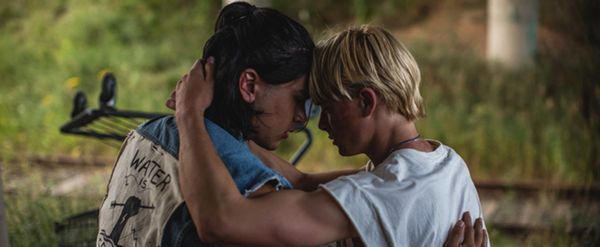Eye For Film >> Movies >> Wildhood (2021) Film Review
Wildhood
Reviewed by: Jennie Kermode

It’s a problem faced by mixed-race people all over the world, especially in youth: all of the racism, a lot less by way of community support. Link (Philip Lewitski) lives with his white father (Joel Thomas Hynes) and white half-brother Travis (Avery Winters-Anthony). His mother is long gone. His father beats him, and it’s getting worse because he’s finding it harder to hide the fact that he is two-spirit. When he and Travis are arrested for trying to scavenge scrap metal from an abandoned factory, he’s beaten unconscious by the police, and he knows that when he gets home, his father will add to the damage. Desperate, he searches through his father’s room for a means of resistance or escape, and finds, instead, a box of letters from his mother. His father has lied to him. She’s still alive, and has been writing to him all these years.
So begins Link’s quest to reunite with a woman who may or may not want him in her life. He takes Travis along for the ride, perhaps to keep him safe, perhaps just to spite his father, who pursues them. They get a lucky break at a food store where a stranger, Pasmay (Joshua Odjick) intervenes as the shopkeeper accuses them of stealing, then offers them a ride. Pasmay is full-blooded Mi’kmaw and openly two-spirit, making a living by travelling around and performing traditional dances at social events. Link is uncomfortable about the situation at first, perhaps because of Pasmay’s obvious attraction to him, which he doesn’t know how to process, having internalised a lot of prejudice from his time in white society – but he and Travis don’t have a lot of options, so when Pasmay offers to help them on the next stage of their journey, they agree.

Trust in strangers is a big theme in this sweet-natured film, which is based on director Bretten Hannam’s 2019 short Wildfire. As regular hitchhikers will tell you, you hear the horror stories but most of the time people are pretty decent, even generous. Pasmay’s lifestyle means that he’s at ease with all sorts of people whom Link is sceptical about to begin with, which increasingly leads Travis to look to him as a source of authority, but he’s less confident when dealing with the white establishment. He’s quick to call out casual racism, which makes Link uncomfortable and even prompts him to apologise to people who, whether or not they realise it, have made pretty grotesque statements. Despite the ugliness he has already faced in life, he struggles to accept himself as an outsider to mainstream Canadian culture.
The psychological journey which Link goes through as the three travel together is at least as important as the physical one. Learning to let go of his striving for white privilege becomes easier as he encounters Mi’kmaw people who want to help and support him partly because they see him as one of their own. In the meantime, he gradually lets his guard down with Pasmay, leading a tender romance whose inevitability Travis seems to be aware of before he is. Winters-Anthony brings an appealing cynicism to the boy, which helps to keep the film from getting schmaltzy.
Nevertheless, there are occasional problems here with excessive sentiment, especially where Hannam pads out the narrative with dreamy sequences of the three enjoying the outdoor life together. We get the point: the views are beautiful, the young people are beautiful, it’s nice that they’re finding joy in life, but still, this does go on a bit. By contrast, the scene when Link finally gives way to his feelings for Pasmay carries a lot more meaning and is narratively powerful as well as erotic. It has a lot to build on, with the body language between the two nicely observed from the start.
The tale is ultimately quite a slender one but it will appeal to fans of romance and it’s nicely played. Lewitski and Odjick have great chemistry, whilst Winters-Anthony’s dry wit is bound to attract attention from casting directors. It took Hannam the best part of a decade to bring this to the screen and with indigenous talent still drastically under-represented, it’s an important achievement. The reaction when it screened at Flare in London demonstrates that it has the ability to appeal to international audiences, and it is a refreshing – and perhaps more realistic – escape from the tedious cynicism currently dominating popular cinema. This is a film which celebrates self-realisation and taking chances.
Reviewed on: 08 Apr 2022

















